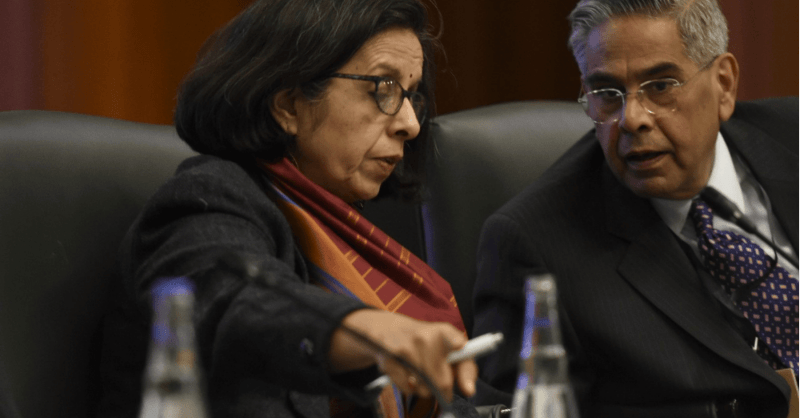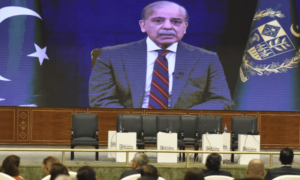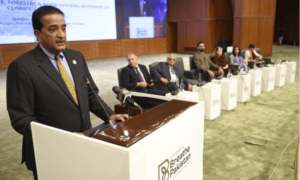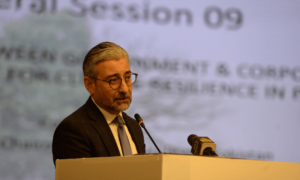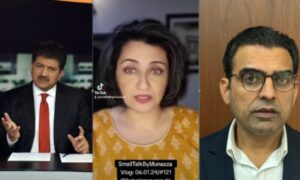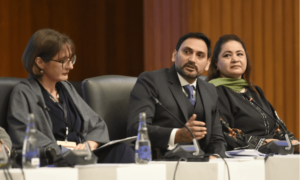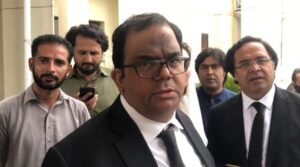Unilever Pakistan CEO Amir Paracha says, “In the flight, fight or freeze response against climate change, we can only fight.”
The second and final day of DawnMedia’s ‘Breathe Pakistan’ global climate conference has begun on Friday, bringing together experts and leaders to find solutions to climate change with them calling for urgent funding to power adaptation initiatives to respond to threats posed by changing environmental and climatic conditions.
The moot aims to make Pakistan climate-resilient by 2047 while fostering regional cooperation across South Asia, where countries face shared challenges of rising temperatures, water scarcity and increasing natural disasters.
2:48pm — Soumashree Sarkar, News Editor, The Wire, Delhi speaks again
2:45pm — Emiliya Mychasuk, Climate Editor, Financial Times, UK speaks again
She noted that when covering climate stories, it’s not just about covering a particular company causing environmental damage but assessing the wider impact to society.
2:38pm — Kanak Mani Dixit, Founder and Editor Himal, Nepal
Kanak Mani Dixit said, “We are standing at the edge of the cliff, actually we’re already falling down the cliff. If we were to do ‘he said, she said’ journalism, it certainly doesn’t serve the purpose of covering the climate crisis. We no longer call it climate change because the semantics always catch up with us. Now we should be talking about climate emergency.”
He added, “Some may say that the day of media is over, it is the age of social media. Then let’s understand how can social media bring change.”
2:35pm — Nirupama Subramanian, former foreign correspondent in Islamabad for The Hindu
Speaking about the way newsrooms work in her country, she said, “Even coverage of climate issues is guided by national interest.”
2:29pm — Emiliya Mychasuk, Climate Editor, Financial Times, UK
Emiliya Mychasuk said, “One of the things that has surprised me about climate reporting, climate information and climate information is how much jargon there is, how much knowledge-holding there is.”
She further said, “People in the climate world, particularly at levels like the UN and others, hold the knowledge and mask it with acronyms. […] I don’t see as much explanatory journalism happening in climate.”
2:24pm — Ali Tauqeer Sheikh, freelance journalist and climate activist
Ali Tauqeer Sheikh highlighted that climate change transcends borders stating, “Every climate issue is, in essence, a regional climate issue. There cannot be national solutions. When it comes to river flows, most of our rivers are transboundary.”
“While disaster reporting continues to be important, the reader is looking at three things: nuanced coverage, solutions-oriented approach, and they want to learn what is happening in similar ecosystems elsewhere,” he added.
2:21pm — Soumashree Sarkar, News Editor, The Wire, Delhi
Speaking about climate desks in Indian newsrooms, she said, “Despite being a small team, we have a dedicated climate change journalist, and many people in our organisation report on climate. This is, however, not replicated in the mainstream media.
“We usually have independent media doing the work that needs to be done when reporting on climate. One of the main reasons for that is that there has been a watering-down of the environmental laws in India over the last few years.”
2:16pm — Mahfuz Anam, Editor The Daily Star Dhaka, Bangladesh
Speaking about the urgency of addressing climate change, Mahfuz Anam said, “Journalists and media houses in South Asia are not as serious about the issue of climate change as they should be. I think we journalists are missing a very important point. Climate change is one challenge which we have to rise up to and respond to within a certain amount of time.”
2:10pm — Dawn Editor Zaffar Abbas headlines session on Media and Climate Change
Kanak Mani Dixit, Founder and Editor Himal, Nepal, Mushahid Hussain, Former Editor The Muslim, Islamabad, Nirupama Subramanian, Previously Foreign Correspondent in Islamabad for The Hindu, Chennai, Ali Tauqeer Sheikh, Freelance Journalist and Climate Activist, Pakistan, Soumashree Sarkar, News Editor, The Wire, Delhi
1:10pm — Lunch and Prayer Break
The next session will resume shortly.
1:06pm — Daud Munir concludes the session
Daud Munir said that the “consciousness that exists in corporate leaders and work being done is very heartening to see.”
He concluded the session by reflecting on themes of collective action, capacity (financial, legal and regulatory) and high-quality investment pipeline.
12:51pm — Amir Paracha, Chairman & CEO Unilever, Pakistan, speaks
He said that climate change had become a topic of discussion because everyone was impacted by it.
“What has happened in California … it will not be sparing any of us,” he said, talking about the recent wildfires there.
“There is apocalyptic horror … yet the sense of disengagement and lack of speed to do more feels like a threat. We are centuries away from the future, which is not the reality.”
He added: “In the flight, fight or freeze response against climate change, we can only fight.
“It is no longer just about token representation for climate change; it is much more than that. Every corporate company should come together for it.”
He went on to say that true impact happens when environmental and social goals align with business and commercial goals.
“This means when sustainability pays, business sticks with it, otherwise it moves one.”
12:45pm — Khalid Mehmood Shaikh, CEO Sindh People’s Housing for Flood Affectees (SPHF), takes over
Speaking about the Sindh government’s post-flood rehabilitation programme, he said, “Our [public sector] mandate is to reconstruct 2.1m houses, so far we have put 900,000 houses, while 50,000 are being constructed every month.”
He added that the private beneficiaries were doing this while banks were helping the government.
“Our job is to create a vision and bring the policies which are private sector inducive.”
12:35pm — Sobiah Becker, Deutsche Gesellschaft Für Internationale Zusammenarbeit (Giz) GMBH, speaks
Calling for compliance-driven adaptation, she said, “It is very critical that we move away from the idea that sustainability is something that is being forced upon us and instead focus on the fact that sustainable climate resilient industries open up new markets, foster innovation and build resilience for both markets and environmental shifts.”
Referring to Pakistan’s high vulnerability to climate, she added, “We cannot effectively address the physical risk in this country until we have a cohesive and effective transition framework. So, you can have all the policies in the world, but if these policies are not regulated, informed or monitored, then we are not going to get too far.”
12:27pm — Jo Moir, Development Director, British High Commission Islamabad, speaks
“You need to cost up the risk of not adapting to climate change. We should be able to ask: If we don’t invest in better seed varieties that are resistant to drought and if we don’t provide the right sheds for our livestock, this is how much it’s going to cost. Because when you know the cost, you can start prioritising what to do first,” Moir said.
WATCH: Climate activist Zunaira speaks on why the youth needs to work towards climate change
12:15pm — Zeeshan Sheikh, IFC Country Manager
“As part of the World Bank Group, trying to further the climate agenda is a priority for us, and in a country like Pakistan, which is among the most vulnerable when it comes to the risks of climate change, it is arguably one of the most important areas of engagement.”
He pointed out how the circular economy agenda was a major issue for a country like Pakistan, which was producing 50 million tons of waste per year and almost none of it was being recycled.
12:07pm — Aasim Wajid Jawad, Group Head-Strategy, Transformation & Customer Experience, Bank Alfalah
Talking about the role of the banking sector in tackling environmental challenges and climate change, he said, “We are an important cog in the wheel, and very conscious about our social responsibility and safeguarding everyone’s deposits. So we have to ensure that the financial system remains sound. In the same way, we have to be caring towards our people and the communities that we live in.”
He said that Bank Alfalah was one of the largest donors to rehabilitate the flood affectees, making a donation of $10 million. “We invested a lot in getting people sustainable housing as we are very conscious about the environment”.
12:01pm — Nabila Yazdani, Head of Strategy, Communication & Sustainability, Zong CMPAK
“Our focus is on how we invest in our infrastructure which is energy-sufficient and sustainable in the long run,” Yazdani said.
She also spoke on the steps taken by Zong to reduce carbon emissions such as solarisation and highlighted the importance of digitalisation.
11:55am — Danish Khaliq, VP Sales and Strategy, BYD / Mega Motor Company
“When we talk about the impact on emissions, when we specifically look at EVs, there is a reduction of 70 to 80pc in comparison to traditional vehicles. And plug-in hybrid vehicles, there is a 60pc reduction,” he said.
Speaking on BYD’s commitment towards the environment, he said, “There has been a carbon reduction of about 80 million tonnes from the switch over in EVs produced by BYD. That is equivalent to 1.3 bn trees absorbing carbon from the environment.”
11:47am — Kate Wilson Hargreaves, Director Climate and Environment DAI UK
“I think the private sector has three big things that it can do to unblock climate finance challenges. To quote Valerie Hickey, we need to fix the plumbing, so the enabling environment for climate finance needs fixing and support,” Hargreaves said.
She highlighted the role of the private sector in fixing the environment for climate finance, creating a high-quality pipeline of banking projects and unlocking barriers for marginalised groups.
11:38am — Shahzain Munir stresses need to keep food affordable for masses
“We have climate change as a challenge, and equally catastrophic is malnutrition and keeping food affordable for our masses.
“Climate change is not everyone’s problem: it’s predominantly a problem for the poor. And we have to face the facts,” the executive director of EBM said.
He said that the private sector would lead, but the time for awareness and projects was over.
“But we need the government to support us in keeping food affordable for our masses.”
11:28am — Fakhar Ahmed, Chief Corporate & Regulatory Officer, Jazz
Speaking on digitalisation, he said: “Tech companies have started to do a lot. Most companies are geared towards net zero ambition which is number one in the largest scope of things which is to reduce their carbon footprint.”
“All the tech and tech economy is powered by electricity and electricity comes from fossil fuels, batteries of lithium … So what do we do?”
Ahmed spoke about the role of tech companies in promoting early-warning systems, disaster mitigation, and actions to be taken in post-disaster situations.
He highlighted that technology companies can take the following measures: renewable energy, raise awareness, early warning system for climate disasters and post-disaster factors.
11:26am — Wajeeha Qamar, Parliamentary Secretary Ministry of Planning Development and Special Initiatives
She shed light on how the Pakistani government had revised its EV (electric vehicle) policy and established a public-private partnership framework to encourage private-sector investment in clean transportation.
“Incentives have been developed to promote the adoption of low-emission vehicles, and emission standards are also being developed to enforce regular emissions,” she said.
11:18 — Syed Babar Ali, Founder, Lahore University of Management Sciences (LUMS) speaks
He stressed the need for Pakistan to realise how important it is to save our water. “The industries can play a very important role in reducing the quantity of fresh water they use. The freshwater they use should be recycled to make sure not a drop of that is wasted.”
He noted that it is financially advantageous to recycle chrome found in the leather industry. Syed Babar Ali also called for greater education of farmers to use drip irrigation, for example, calling on the government to educate itself, after which the knowledge should be shared with industries and farmers.
“We still have more water than most countries in the world, and we should be grateful for what we have. We should look after it, preserve it. We are not harvesting our rainwater the way it can be done, both in the cities and elsewhere.”
11:13am — Muneer Kamal, CEO & Secretary General Pakistan Banks Association
Now Muneer Kamal (Former chairman of the board of directors of the Pakistan Stock Exchange) is speaking.
He quoted a COP23 report stating that Pakistan is the eighth most vulnerable country as far as climate change is concerned. “This conference is a wake-up call for us to do something,” he said, adding that there is a lot more left to be done to address this challenge.
“We have seen the impact of climate change in 2022. It is now globally accepted that what happened in 2022 in Pakistan through the massive floods was a direct result of climate change. And just within one year and a few months, a poor country like Pakistan lost about $12.5 billion — that’s staggering for a country that’s struggling to reach $2,000 per capita income.”
“Between 2023 and 2030, Pakistan need $348bn. If we do not address this aspect now, Pakistan by 2050 will have lost 18-20pc of its GDP.”
11:02am — Daud Munir takes the podium
Munir, a policy expert and senior legal practitioner, noted that climate change is a tough subject, one that’s high on the complexity scale. “It has impacts that emerge somewhere in the future and causes that may be based in countries or beyond borders. It is an issue that implores us to leave the present and think about future generations.
“The collaboration between the public sector and private sector takes centre stage. It’s not a peripheral issue; to me, it stands at the very centre of how the solution comes in,” Munir said.
He noted the need for a fundamental shift to tackle the climate problem, in a new interaction between the government and private sector. Munir acknowledged that the government has taken a facilitative turn.
“Through the Public Private Partnership Authority, the P3A, there is now a fully functional formal avenue to foster the public-private partnerships and dialogue, which is important as it exemplifies this fundamental shift in approach.”
11am — Session on govt, private sector dialogue on climate resilience
10:40am — Break
The conference is currently on a break, stay tuned for more live updates.
10:27am — Abdullah Fadil says mobilising young people crucial in fight against climate change
The Unicef Representative in Pakistan questioned how best to utilise social media to mobilise young people in the fight against climate change. He highlighted the need to take concrete action to make an impact in Pakistan, especially through community and grassroots initiatives.
“Educating young people and making sure school curriculums include how to protect the climate and have ownership of this issue is crucial,” the Unicef representative said.
He emphasised the need to establish a “national volunteer court” focusing on young people aged 15 to 24, that could mobilise millions of young people to work through the Indus River in terms of restoration and cleaning.
Speaking about broader solutions, he said, “How do we get out of this conference and mobilise these millions of young people, particularly those who are not in education and training? But also for those who are in education and training, how do we combine all of this energy and resources to make an impact in Pakistan? That is, I think, a call to action.”
10:20am — Florence Rolle highlights importance of restoring Indus Basin
The FAO representative in Pakistan spoke on the importance of the Indus ecosystem, calling the Punjab government’s efforts the “engine” for the global and national push for rehabilitating and restoring the Indus basin.
“The focus today for the Indus Basin is about restoration; It’s not only about protection of the whole ecosystem,” she said. “You need to harness the creativity, energy and mobilisation of people” urging the need for “citizenship-led development”.
10:14am — Aban Marker Kabraji speaks on Living Indus
The project began from the call by the UN Secretary General on the triple planetary crisis; the crisis of climate change, biodiversity loss and pollution. She noted the need to focus on the source of sustenance in Pakistan — water.
Kabraji went on to say that since we live in an “extremely unpredictable situation”, we must plan within the context of unpredictability, calling the Living Indus programme Pakistan’s adaptation plan for the future.
9:58am — Romina Khurshid Alam welcomes Zunaira Qayyum Baloch
The Coordinator to the Prime Minister on Climate Change noted that Pakistan stands at a defining moment in its climate journey. “As a country on the frontline of climate change, we face mounting challenges, extreme weather patterns, water scarcity and environmental degradation.”
However, Pakistan is not defined by these challenges alone, she went on to say. “We are defined by our resilience and our ability to overcome adversity,” she said. “We are not merely passive victims of climate change, we are active participants in foraging solutions.”
She highlighted that this was a question of justice; “Pakistan is paying the price of something created by others”. Alam added that the devastating loss of life and critical infrastructure in the recent floods is all the more reason that Pakistan must leave no stone unturned in its effort to rescue, rehabilitate and rebuild.
9:32am — Senior minister Marriyum Aurangzeb speaks on Punjab’s first climate resilience policy
The senior minister has dedicated her keynote address to speaking about the Punjab climate experience over the past 12 months. “We had to take a comprehensive, holistic, integrated, multisectoral approach towards climate resilience across Punjab,” she said while addressing severe floods, heatwaves, hazardous air quality and water shortages in South Punjab.
Punjab has formulated its first climate resilience policy through the lens of adaptation and mitigation, with climate justice being central to the policy. A total of Rs10 billion has been allocated to smog mitigation, while Rs100bn has been allocated to climate resilience projects across Punjab.
While noting that climate change transcends borders, Aurangzeb unveiled that Pakistan has begun its dialogue with India and written a letter to the foreign ministry to initiate dialogue with countries in the region that have a direct impact on the air quality.
9:27am — Planning, Development & Special Initiatives For Pakistan Ahsan Iqbal
The planning minister suggested that the United Nations create some form of a global environmental tax for polluters, and from that tax, the money should be used as a fund to help countries in the Global South meet the challenges of climate change.
Day one of the moot began at 10am and concluded past 6pm at Islamabad’s Jinnah Convention Centre after a marathon session of discussions, keynote addresses, and speeches by various experts and dignitaries elaborating on issues, challenges, opportunities and solutions related to climate change and pollution.
Speakers
The conference will have a roundtable to inspire dialogue between the government and the corporate sector and explore sustainable public-private partnerships, which will be attended by Deputy Prime Minister Ishaq Dar and Planning Minister Ahsan Iqbal, among others.
A session on agriculture, forestry, and food systems in climate change will be attended by agriculture and forestry experts at which Food and Agriculture Organisation (FAO) Representative Florence Rolle, Climate Change Ministry Secretary Aisha Humera Chaudhry, and former climate change minister Malik Amin Aslam will speak.
In the concluding session of the conference today (February 7), former prime minister and Senate Chairman Yousaf Raza Gilani will address the audience.
Other speakers include climate expert Ali Tauqeer Sheikh, British High Commissioner Jane Marriott, Petroleum Minister Senator Musadik Malik, climate activist Karishma Ali, and youth activist Zunaira Qayyum Baloch, among others.
For our Day 1 coverage, read more here.
- Desk Reporthttps://foresightmags.com/author/admin/

